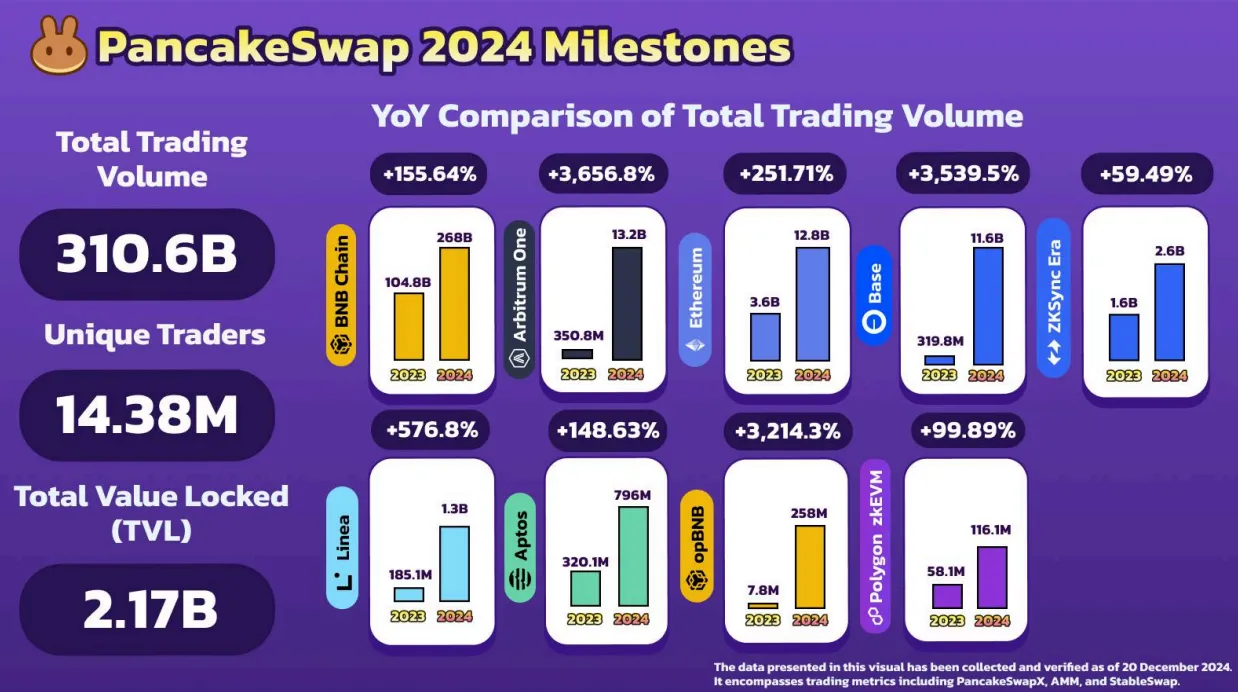As the year winds down the crypto world is still moving fast with big developments across the board.
This week’s digest covers the top gainers and losers, PancakeSwap’s growth, the debate around Sam Bankman-Fried’s pardon, the differing security in DeFi and CeFi and the energy demands of crypto and AI.
Top Gainers and Losers
Here’s a quick look at the week’s top and worst performers:
Top Gainers
- Bitget Token (BGB): 14.06% up to $7.27 with a 24-hour trading volume of $1.1 billion.
- FTX Token (FTT): 6.38% up to $3.70 with a 24-hour trading volume of $155 million.
- Uniswap (UNI): 1.82% up to $13.50 with a 24-hour trading volume of $446 million.
Top Losers
- Movement (MOVE): 10.41% down to $1.03 with a 24-hour trading volume of $954 million.
- Pudgy Penguins (PENGU): 9.05% down to $0.03523 with a 24-hour trading volume of $895 million.
- Bonk (BONK): 7.54% down to $0.00003062 with a 24-hour trading volume of $254 million.
PancakeSwap’s Record Year
PancakeSwap, a top decentralized exchange (DEX), reported a total volume of $310 billion in 2024, up 179% from last year. This was driven by the growth of layer-2 networks like Arbitrum and Base which saw 3,656% and 3,539% year over year growth respectively. The surge in DeFi activity and user focused updates like the new swap interface and PancakeSwapX have made the user experience much better which contributed to this milestone.

Beyond Arbitrum and Base, PancakeSwap saw growth across multiple chains, 251% on Ethereum and 155% on BNB Chain. The user focused updates like PancakeSwapX, zero fee trading and simplified onboarding process also contributed to its success.
The surge in decentralized exchange activity is also reflected in the total value locked in DeFi protocols which grew 124% this year from $54 billion on Jan 1 to over $121 billion by Dec 24, 2024. PancakeSwap’s ability to add user friendly features and promote cross chain growth makes it a key player in the DeFi space.

Sam Bankman-Fried Pardon Debate
There is talk of a potential pardon for Sam Bankman-Fried, the former CEO of the bankrupt crypto exchange FTX. Convicted on multiple counts of fraud and embezzlement in November 2023 and sentenced to 25 years in prison, Bankman-Fried’s big political donations to the Democratic Party, including $5.2 million to pro-Biden super PACs during the 2020 election cycle have sparked these rumors. Public figures like Elon Musk have weighed in saying a pardon might be coming which has caused public outrage and debate around political favoritism.
I will be shocked if this doesn’t happen
— Elon Musk (@elonmusk) December 23, 2024
And to add to the controversy, FTX collaborators like Caroline Ellison and Gary Wang have been shown leniency. Both got lighter sentences for cooperating with prosecutors which has exposed the unfairness in the system.
A pardon would have far reaching implications not just for the legal case but for the entire financial and judicial system.
Security Trends: DeFi vs. CeFi
A report by blockchain security firm Hacken shows a 40% drop in financial losses due to security incidents in DeFi, from $787 million in 2023 to $474 million in 2024. This is due to better protocols, stronger bridges and advanced cryptographic measures. Bridge related exploits dropped significantly from $338 million in 2023 to $114 million in 2024.
Meanwhile CeFi platforms saw a surge in breaches with losses more than doubling to $694 million in 2024. Notable incidents include the DMM exchange hack and the WazirX hack which together accounted for over $500 million in losses. These hacks highlight the vulnerabilities in private key management and multisignature setups.
Hacken’s report shows the huge difference between DeFi’s progress and CeFi’s struggle. A clear lesson for the industry. DeFi’s proactive measures like multiparty computation and zero-knowledge proofs are working while CeFi’s centralized systems are a target for attackers. Dyma Budorin, CEO of Hacken said “stricter key management practices and automated monitoring systems” are needed to mitigate the risks.
Crypto and AI Energy Demands Strain North American Grids
The North American Electric Reliability Corporation (NERC) has warned about the growing energy demands from cryptocurrency mining and artificial intelligence (AI) operations. These industries are consuming more electricity than ever before, especially in regions like Texas where the peak summer demand is expected to increase 4.6% annually through 2029.
Crypto mining’s variable power usage tied to market conditions makes grid stability more complicated. AI data centers’ heavy processing and cooling needs add to the strain. Sudden load changes in these sectors are similar to the issues with inverter based resources and introduces new risks for grid operators managing variable renewable energy sources.
To address these challenges NERC recommends better demand forecasting, advanced transmission planning and expanded demand side management (DSM) programs. In Texas HB 3390 and crypto miners adopting renewable energy sources like Marathon Digital’s wind farm acquisition are steps to mitigate the impact on the grid.
ERCOT also has energy response and demand response programs to balance the energy grid load during peak hours. These along with legislative initiatives will ensure a more stable and robust energy infrastructure as the technology grows.
In a Nutshell
This week in crypto has seen big moves, DEX growth, legal and political debates, DeFi vs CeFi security and energy consumption of emerging tech. As the space evolves stakeholders must navigate all this with security, sustainability and regulatory compliance to have a robust and inclusive crypto ecosystem.
From PancakeSwap’s record year to the energy issues in North America and the Sam Bankman-Fried drama, the crypto space is dynamic and innovation, transparency and adaptability are key. Every development is a reminder of the balance between growth and responsibility in shaping the future of digital finance.

Disclaimer: All materials on this site are for informational purposes only. None of the material should be interpreted as investment advice. Please note that despite the nature of much of the material created and hosted on this website, HODL FM is not a financial reference resource and the opinions of authors and other contributors are their own and should not be taken as financial advice. If you require advice of this sort, HODL FM strongly recommends contacting a qualified industry professional.




